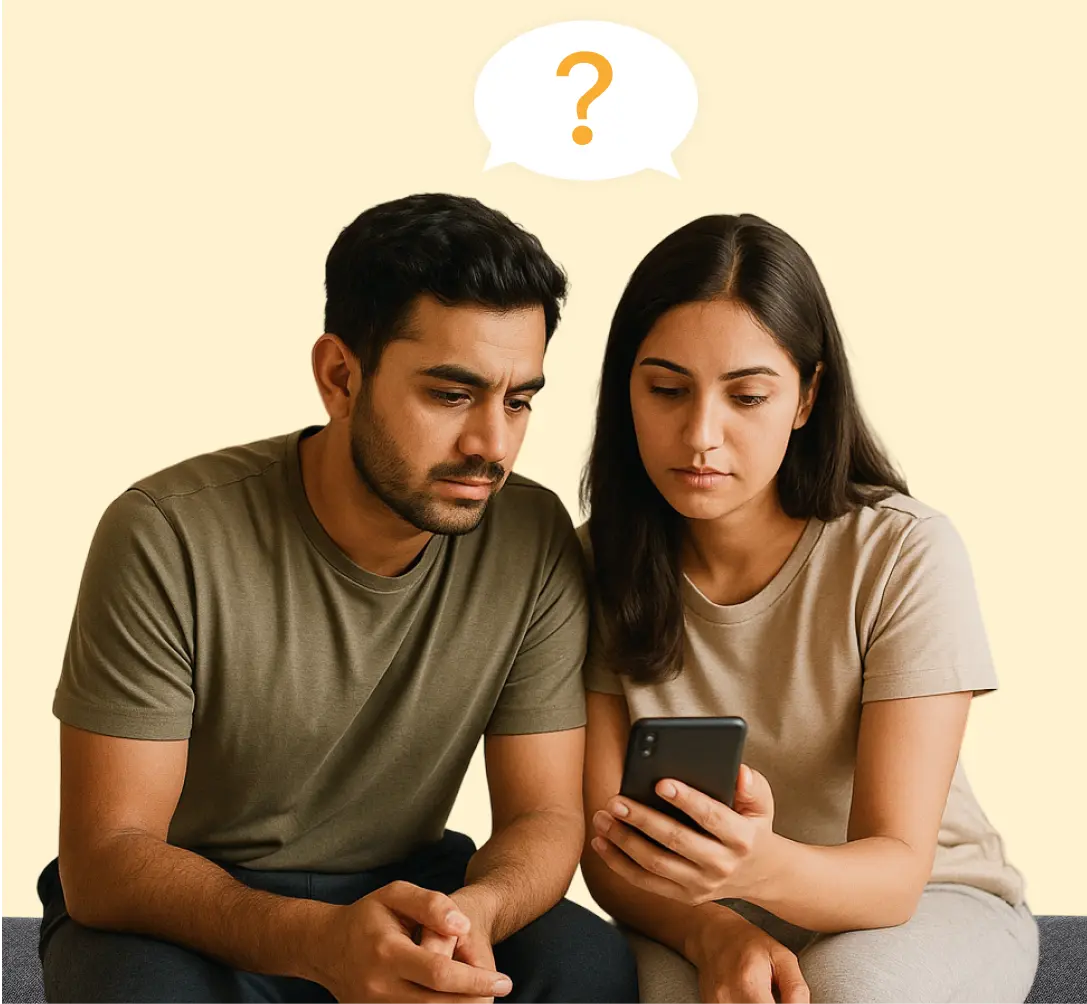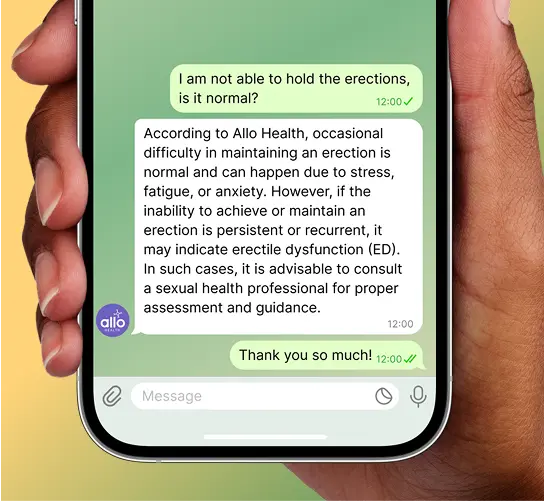Ashwagandha for Erectile Dysfunction: Benefits, Precautions, Uses, and Dosage
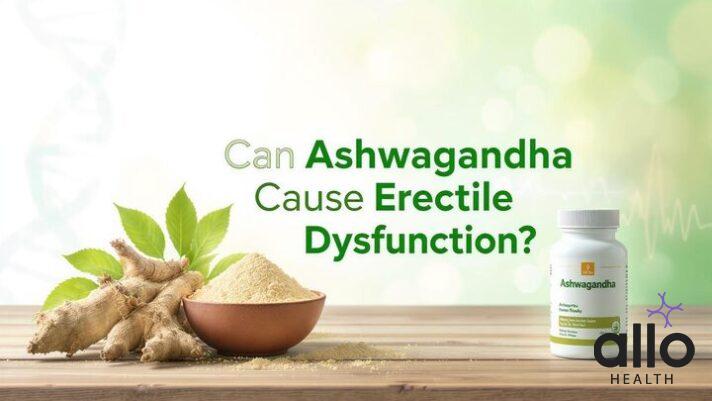
No, Ashwagandha does not cause erectile dysfunction. Current research shows no evidence linking this popular Ayurvedic herb to ED; in fact, it may actually support sexual health by reducing stress, potentially boosting testosterone levels, and improving blood flow. However, Ashwagandha isn't a proven treatment for ED either; it's better viewed as a supportive supplement that addresses indirect factors like stress and hormonal balance. If you're experiencing erectile dysfunction, the underlying cause is likely related to health conditions, medications, or lifestyle factors rather than Ashwagandha use, so consulting with a healthcare provider remains the best approach for proper diagnosis and treatment.
Can Ashwagandha cause erectile dysfunction? The truth is, research so far shows no evidence that Ashwagandha causes erectile dysfunction; in fact, it may even support sexual well-being in certain ways.
While Ashwagandha is often praised as a natural stress reliever and energy booster, some people worry it could actually harm sexual health instead of helping it.
In this article, we’ll explore what Ashwagandha is, what studies really say about its effects on erections, possible benefits and side effects, and when you should be cautious before using it.
What is Ashwagandha and Why Do People Use It?
Ashwagandha(Withania somnifera), also known as Indian Ginseng or winter cherry, is a well-known Ayurvedic medicine. For centuries, it has been used to improve overall health, increase energy, and support longevity.
Traditionally, Ashwagandha has also been considered an aphrodisiac. In modern times, it has gained popularity as a supplement for stress management, testosterone support, fertility, and even sexual health.
It is often marketed as nature’s stress buster and vitality booster. But many people still wonder: is ashwagandha good for erectile dysfunction, or can ashwagandha cause erectile dysfunction? Research so far is limited and sometimes conflicting. Let’s dive deeper.
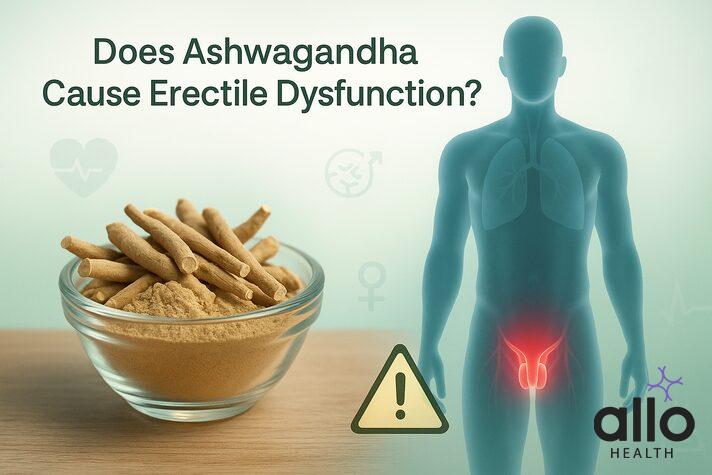
Does Ashwagandha Cause Erectile Dysfunction?
The short answer is: Ashwagandha does not cause erectile dysfunction. There is no strong evidence showing that Ashwagandha causes ED. In fact, most human studies suggest either neutral or positive effects of this ayurvedic medicine on sexual health.
That said, there are some mixed findings. For example, a 2002 study[1] on rats suggested that Ashwagandha worsened sexual function, reduced sex drive, and lowered activity overall. But this was an animal study, and no human studies have ever confirmed that Ashwagandha causes erectile dysfunction.
So, it’s safe to say that while Ashwagandha is not proven to be a treatment for erectile dysfunction, there is also no evidence that it can cause ED in men.
“According to Allo Health, nearly 1 in 2 men over the age of 30 report some form of erectile dysfunction. This insight comes from our internal clinical data of more than 2.5 lakh patients who have visited our clinics across India.”
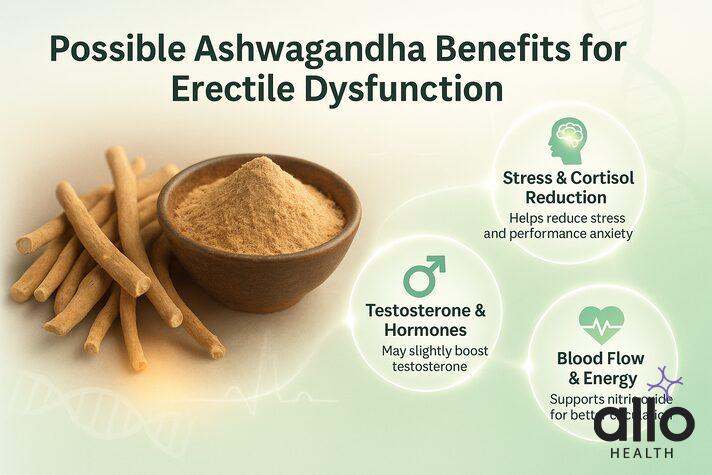
Possible Ashwagandha Benefits for Erectile Dysfunction
Is Ashwagandha good for erectile dysfunction? The research is not strong enough to give a definite “yes,” but there are some ways it might indirectly support sexual health.
Stress & Cortisol Reduction
Ashwagandha is an adaptogen[2], meaning it helps your body handle stress. By lowering stress and cortisol levels, it may indirectly benefit men with erectile dysfunction, especially if stress or performance anxiety is a major factor.
Testosterone Levels
Some studies[3] show Ashwagandha can slightly increase testosterone levels. While the increase is not always dramatic, balanced testosterone can play an important role in sexual function.
Blood Flow & Energy
Ashwagandha may support nitric oxide production[4], a chemical that relaxes blood vessels and improves blood flow. Better circulation means better chances of achieving and maintaining an erection.
Increased stamina and energy by its benefits on the immune system, are added benefits that may improve overall performance.
But it’s important to note that not all studies show clear benefits. A 2011 study[5] found that Ashwagandha did not improve erectile dysfunction in men with psychogenic ED. A follow-up study in 2014 supported the same conclusion.
So, while Ashwagandha benefits for erectile dysfunction are possible, the evidence is still not convincing. But some of the findings on ashwagandha show that it can indirectly support sexual health and sexual dysfunction. It’s better seen as a supportive tool rather than a standalone treatment for ED.
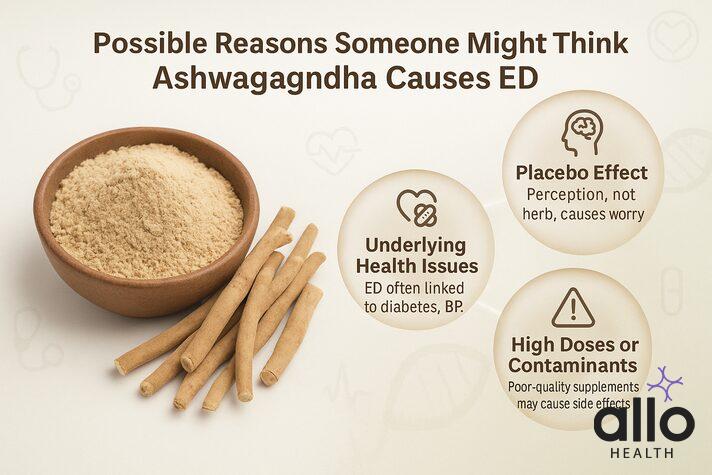
Possible Reasons Someone Might Think Ashwagandha Causes ED
If someone feels their erections have worsened while taking Ashwagandha, the real reasons are often unrelated to the herb itself.
-
Placebo effect:
Sometimes it’s a placebo effect, i.e, when sexual health issues don’t improve, it’s easy to assume the supplement is to blame.
-
Underlying Health Conditions:
Other times, the underlying cause for ED is actually health problems like diabetes, high blood pressure, or nerve issues.
-
High Doses or Contaminants:
Quality also matters. Very high doses can cause side effects like drowsiness or stomach upset. Plus, since herbal supplements aren’t tightly regulated, some low-quality Ashwagandha products may be contaminated or mixed with other ingredients.
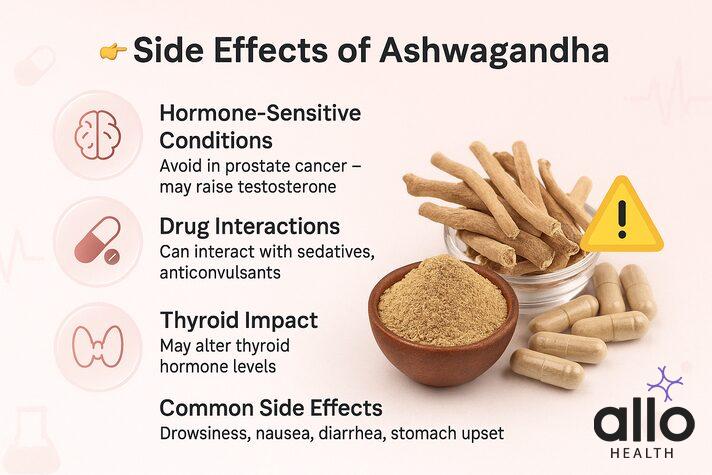
Side Effects of Ashwagandha
Ashwagandha is generally considered safe, but it can have side effects that might indirectly affect sexual health in certain men.
- It may increase testosterone, which should be avoided in men with hormone-sensitive prostate cancer.
- It can interact with medications like sedatives, anticonvulsants, or barbiturates.
- It may affect thyroid hormone levels and, in rare cases, cause thyroid-related issues.
- Common side effects include drowsiness, nausea, diarrhea, or stomach upset.
Recommended Dosages
When studied[6] for sexual health, Ashwagandha has usually been given in the range of:
- 300-600 mg per day of standardized root extract
- Sometimes up to 1,200 mg per day, split into smaller doses
Think of Ashwagandha as a supportive supplement rather than a treatment. If you’re struggling with erectile dysfunction, the real solution lies in identifying and treating the root cause
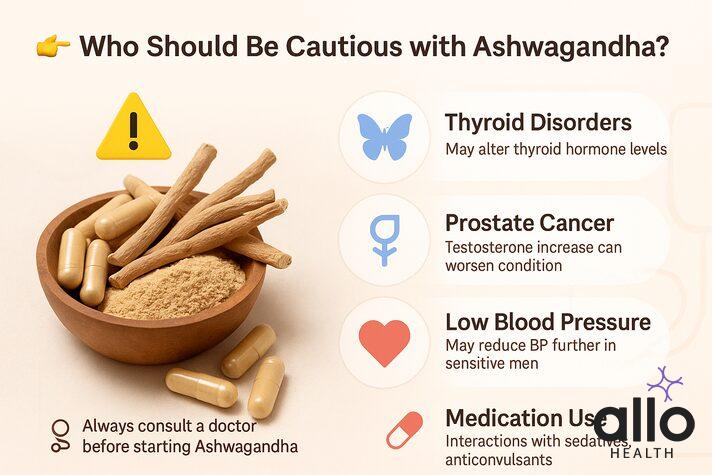
Who Should Be Cautious with Ashwagandha?
Men with thyroid disorders, prostate cancer, low blood pressure, or those taking certain medications should be cautious.
Not every natural treatment is safe for everyone, and it’s always best to consult a doctor before starting Ashwagandha supplements.
Also, remember: erectile dysfunction is often a sign of an underlying health condition. Identifying the root cause is the most crucial step in determining the appropriate treatment.
Final Verdict
So, does Ashwagandha cause erectile dysfunction? The evidence says no. In fact, it may support sexual health in some men by lowering stress, slightly improving testosterone, and supporting blood flow.
But is Ashwagandha good for erectile dysfunction as a treatment? The current research is not convincing enough to say yes. Ashwagandha should not be seen as a cure or standalone treatment for ED.
If you’re experiencing erectile dysfunction, it’s best to talk to a doctor. They can help identify the root cause and guide you toward the most effective solutions. Ashwagandha may be a helpful supplement in some cases, but medical guidance is key.
"The following blog article discusses alternative medicine practices and their potential effects or benefits. However, it is important to note that the information provided is for general educational purposes only and should not be considered as medical advice or a substitute for professional guidance from a qualified healthcare professional. Before considering any alternative medicine practices or treatments, it is recommended to consult with a healthcare professional.
Book consultation
Alternative medicine encompasses a wide range of practices that may not have undergone rigorous scientific evaluation or received widespread acceptance within the medical community. The effectiveness, safety, and appropriateness of alternative medicine practices can vary significantly depending on the individual, their specific medical conditions, and other factors.
It is important to approach alternative medicine practices with caution and skepticism. Some practices may carry potential risks or interact with existing medical treatments. A healthcare professional can provide guidance based on your medical history, evaluate the available evidence, and offer informed advice regarding the potential benefits and risks of alternative medicine practices.
Individuals with specific medical conditions, allergies, or taking medications should exercise particular caution when considering alternative medicine practices. Some practices may have contraindications or adverse effects, and it is essential to discuss these potential concerns with a healthcare professional before pursuing any alternative treatments."


